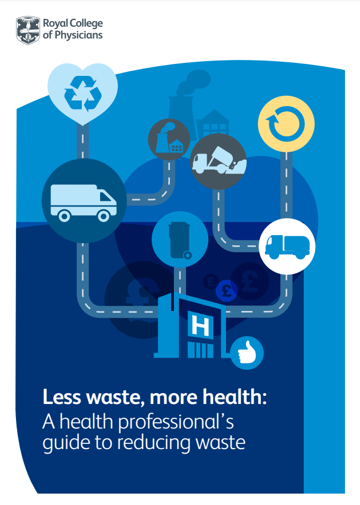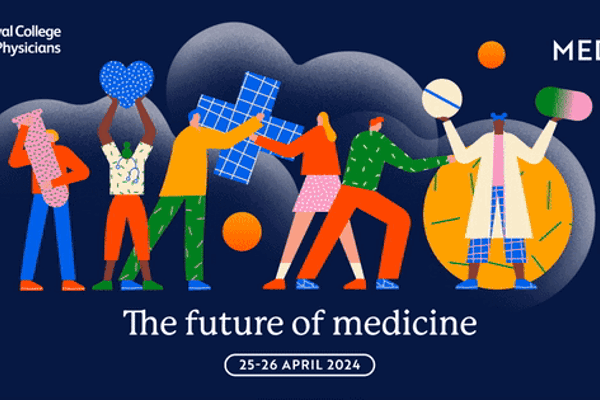The Royal College of Physicians (RCP) is deeply committed to minimising the environmental impacts of its operations and is continually seeking innovative ways to improve its sustainability.
As a royal college and employer
The RCP began divesting from fossil fuel companies more than 5 years ago and published a new climate policy at the start of 2020, setting a deadline of 2023 for it to end its investment in fossil fuel companies. In April 2021 it announced that it had already achieved this.
The RCP opened its new northern home, RCP at The Spine in 2021, built in partnership with Liverpool City Council, the RCP’s seven floors of the 13-floor building offer one of the healthiest workspaces in the world. Designed to meet the highest level of the stringent international WELL building standard – Platinum – RCP at The Spine will enhance the wellbeing of those working in this inspirational space. If it achieves Platinum standard RCP at the Spine will be only the fourth building in the UK to have done so and only the second in north west England.
As a new build, RCP at The Spine gave the RCP the opportunity to incorporate sustainability throughout the building while it was being designed - much more straightforward than having to retrofit sustainability into its 1960s headquarters in Regent’s Park, London.
The RCP was the first royal college to receive Carbon Trust Standard in recognition of its commitment to sustainable working. The certification, in 2018, followed a reduction of 30% in the RCP’s total carbon footprint over the previous 3 years.
While the energy crisis forced the organisation to move away from using electricity from 100% renewable energy in 2022, the aim is to return to this as soon as possible. Meanwhile, work began in 2022 to upgrade the plant and electrical infrastructure at Regent’s Park to make it more energy efficient and reduce the building’s carbon footprint.
In 2019, the RCP received a Silver award from its waste disposal provider, First Mile for recycling 144,480 kg of waste (including 4,925kg of cardboard, 9,125kg of paper, 18,000kg of glass and 6000kg of junk) and offsetting 62.2 kg of CO2.
Also in 2019, CH&Co, the RCP’s caterer, was awarded three stars by the Sustainable Restaurant Association for its commitment to using local and seasonal produce, reducing the environmental impact of transport, serving sustainably caught fish, improving energy efficiency and reducing food waste.
The RCP will be working towards gaining both ISO 14001 and the Carbon Trust Standard for RCP at The Spine. As part of Liverpool’s wider Paddington Village development, The Spine benefits from an energy-efficient combined plant providing heat and power to the whole development.
Throughout RCP at The Spine, the smart building management system regulates the temperature and lighting, responds to external lighting conditions and saves energy by turning lights off when rooms are not being used. LED lighting saves 50% of energy costs compared to traditional lighting. Similarly, programmable lift technology minimises journeys by empty lifts, and there are posters to encourage people to use the signature ‘Spine’ staircase.
The fitout of the building gave the RCP the opportunity to use sustainable hardwoods for doors, panelling and the signature helical staircases, coupled with sustainably sourced carpets, meeting and dining tables and chairs. Low VOC paints have been used throughout (VOCs - volatile organic compounds - are carbon-based chemicals that easily get into the air) and the cleaning regime uses non-solvent products.
As part of their commitment to sustainability, construction and fitout partners also assured the RCP that a percentage of jobs on the site were given to local people, apprentice roles were created and locally sourced materials were used where possible. Community engagement and schools projects also featured in a rounded approach to building The Spine.

Within the NHS
Each year, the NHS produces more carbon emissions than all the planes taking off from Heathrow combined. That contributes significantly to global climate change and presents a huge and imminent threat to health, and therefore service demand.
The RCP’s report, Breaking the fever: Sustainability and climate change in the NHS gives an overview of the impact of climate change on healthcare in the UK. It also explores how physicians and the NHS can contribute to reducing greenhouse gas emissions.
In England, there are 165 hospital trusts with a combined expenditure of over £4.6 billion per annum on medical supplies and other consumables. What we use and how we dispose of it has an impact not only on the finances of the NHS but the environment and population health. RCP’s Less waste, more health report explains how health professionals can positively influence societal health and wellbeing by making simple changes to the procurement and disposal of medical supplies.
The RCP submitted evidence to the NHS Net Zero call for evidence, which was seeking ideas on how the NHS could reach net-zero carbon emissions by 2050.

As a public health promoter
The RCP has a long history of promoting public health through evidence-based policy. Physicians and medical professionals have a key role to play not only in managing ill health, but also in supporting people to live healthier lives.
Led by RCP’s special adviser on air quality Professor Stephen Holgate, the college is working with colleagues across the UK's major health institutions to tackle public health challenges posed by air pollution. 40,000 deaths a year are attributable to exposure to outdoor air pollution which we know plays a role in many of the major health challenges of our day.
The RCP’s report, Every breath we take: the lifelong impact of air pollution sets out the dangerous impact air pollution is currently having on our nation’s health. It offers a number of major reform proposals setting to tackle the problem of air pollution and emphasises how the public can do their part to reduce pollutant exposure.
Since the publication of Every breath we take: the lifelong impact of air pollution, the RCP has been working closely with policymakers to take forward recommendations from the report. We have been contributing to Public Health England’s work on developing a strong evidence base on the health impacts of air pollution and gave oral evidence to MPs as part of a joint select committee inquiry on air quality.
The RCP is a founding member of the UK Health Alliance on Climate Change which brings together doctors, nurses and other healthcare professionals to advocate for better responses to climate change that protect and promote public health.






